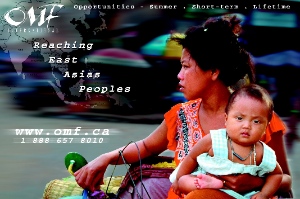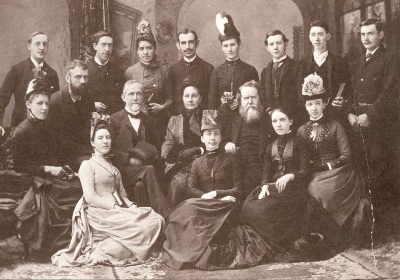During an interview last summer, Archbishop of Canterbury Justin Welby was asked which three people, from all of history, he would most like to sit with for a coffee. One of his choices was James Hudson Taylor: “I’d love to just hear him talk about Jesus . . . the greatest missionary, who saw so little fruit in a lifetime of sacrifice in China, and now sees a church from heaven, he sees 30 – 40 million people.”
Some estimates put the number of Christians in China closer to 100 million, but whatever the number is, the church is thriving, and much of the credit for its establishment and growth must go to Taylor’s China Inland Mission, now OMF International.
Following is an account from OMF International of its history, to recognize its 150th anniversary. OMF was founded as China Inland Mission on June 25, 1865, when James Hudson Taylor prayed on Brighton beach in the south of England for companions to help him reach the interior of China.
A concerned young man walked the beach at Brighton, England. His six years’ missionary service in China had intensified his burden for the interior of that great land. But there was no mission organization in China prepared to launch out into the inland provinces. He was burdened by the fact that every hour of the day a thousand Chinese were dying without Christ.
The young man was Hudson Taylor. He was convinced that a new mission was needed, but the idea of shouldering such a burden troubled him. Suddenly on that Brighton beach, a fresh truth dawned: the responsibility was not his but God’s! On the flyleaf of his Bible, he wrote, “Prayed for 24 willing, skillful labourers at Brighton, June 25, 1865.” A bank account under the new name ‘China Inland Mission’ was opened with the small sum of 10 pounds “and all the promises of God.”
Less than a year after the Brighton beach decision, Hudson Taylor and a party of 18 adults and four children sailed for China. The call for 24 missionaries was being answered.
Low funds and other factors made the years following 1870 some of the darkest in the history of China and the mission. Yet a call for 18 more workers was made. In response to the call there were 60 offers for service; 10 were accepted and sailed in 1875, with eight more the following year. A period of expansion followed as these new workers two by two took up residence in nine new provinces.
A second call for advance came in 1881. With the total number of missionaries barely a hundred, friends at home were challenged to pray for 70 new workers in three years. God answered and within the allotted time 73 new workers had sailed for China.
Right on their heels came the famous Cambridge Seven, whose response and dedication to the task stirred the whole of Christendom. Hudson Taylor, while stressing the need to preach widely, urged that local churches be established and matured, that church buildings be of Chinese not foreign design, and that leaders of the churches be Chinese Christians.
Hudson Taylor’s burden for the still unreached areas pressed him further. In 1886 he issued another call for 100 new workers in two years; 102 were sent out by the end of 1887.
An advance of a different nature took place in 1888, when D.L. Moody and others in the United States invited Hudson Taylor to cross the Atlantic for some meetings. Taylor spoke at Moody’s college at Northfield and at the Niagara-on-the-Lake Conference. People were moved to give towards the support of missionaries for China.
Hudson Taylor’s response was, “To have had missionaries and no money would not have caused me any anxiety . . . but to have money and no missionaries was a very serious matter.” God was leading Taylor to ask for workers from North America for service to China.
The first North American party of 14 new missionaries departed from Toronto for China in September 1888. Thus the CIM was internationalized. Today OMF is made up of people from more than 30 different nationalities.
The work made spectacular advance in the years that followed, particularly among the many tribal peoples of the provinces of Sichuan, Guizhou and Yunnan. There was a mass turning to Christ. Throughout China there was much to encourage, and little to indicate the catastrophe which lay around the corner.
In 1900 the Boxers – an officially sponsored peasant rebellion group committed to driving out all foreigners – set out to exterminate all foreigners in China in a reign of terror during which hundreds of missionaries and Chinese Christians were put to death.
The CIM lost 58 missionaries and 21 children as martyrs. When the uprising was at its height, all missionaries were moved to the coast. When it was all over, indemnity money was procured by consulate officials and offered to the foreign mission societies, but Hudson Taylor was led not to accept anything. This generous response made a great impression on the authorities and many Chinese were more approachable with the gospel than previously. During that period the work force of the CIM increased to 933.
Hudson Taylor died in 1905 after 50 years of active service for China and D.E. Hoste, one of the Cambridge Seven, was appointed mission director.
Again in 1927, the political situation was so bad that consulate officials strongly recommended all Western personnel to withdraw to the coast. The situation for the Chinese Christians was as devastating as in 1900.
Christians everywhere were persecuted, tortured and put to death and mission and church property was ransacked and destroyed. Half of the overall missionary community went home, never to return to China.
In the midst of this darkness the CIM issued a new call for advance-this time for 200 new missionaries over two years. “How impossible!” some said. “This is the wrong time for more missionaries.” However, prayer was made everywhere and the challenge presented in the different homelands. By 1931 there were 203 new missionaries on the field.
At its peak in 1939 the CIM had over 1,300 missionaries, and almost 200,000 Chinese and minority people had been baptized. During the years of World War II and those that followed missionaries had fantastic opportunities among university students and professionals, some of whom held influential positions in the government.
The benefit to the church of these years of war is difficult to assess. It was a time of great harvest and a preparation for the difficult days when the communist armies, with their atheistic emphasis, would be in control.
Many missions pulled out in 1948, but the CIM was one which attempted to stay. Having so decided, the CIM took a further step of faith and brought in 48 new workers to Shanghai in 1948 and 49 in 1949. But it eventually became plain that the continued presence of the missionaries was causing suspicion and harassment for the Chinese believers. So the momentous decision was made in 1950 that in the best interest of the Chinese church the CIM would withdraw.
 The China Inland Mission now faced the question of whether it should continue to exist. Was this to be the end, or was there something new in God’s plan? It was either extinction or expansion. Discovering great pockets of need that included totally unreached people groups in the countries surrounding China, the CIM decided God wanted them to move forward in new faith. The mission began again in East Asia, establishing headquarters in Singapore.
The China Inland Mission now faced the question of whether it should continue to exist. Was this to be the end, or was there something new in God’s plan? It was either extinction or expansion. Discovering great pockets of need that included totally unreached people groups in the countries surrounding China, the CIM decided God wanted them to move forward in new faith. The mission began again in East Asia, establishing headquarters in Singapore.
A new name, Overseas Missionary Fellowship (OMF), was adopted in 1964 and the old name (China Inland Mission) was dropped. Asian Christians also began to be accepted into membership during this period, and home councils were formed in Japan, Korea, Singapore, Hong Kong, Malaysia, the Philippines, Taiwan and Indonesia. Today, more than 30 percent of OMF’s membership comes from Asia.
In the more than 60 plus years since the mission left China, many people groups of East Asia have been evangelized through the work of OMF. God is still leading OMF International, to break new ground in the most dramatically changing region of the world, whether in outreach to over 100 people groups, working with street children in Bangkok, seeking new ways of evangelizing the unreached of Manila, teaching and influencing students in Taiwan and Indonesia, pioneering a witness among the Malays in South Thailand, translating the scriptures or living as salt and light in countries closed to traditional missionary service. OMF missionaries are giving their energies towards building a strong church in the countries of East Asia.
Today OMF International is a diverse, evangelical mission agency of more than 1,600 workers from 30 different countries. We continue to press on to know the Lord and make him known among the peoples of East Asia. Growing out of the same passion God placed in the heart of our founder, Hudson Taylor, we serve the people of East Asia. Christ’s love compels us to touch lives by giving our lives to him first, and then to others. Through serving, building relationships, evangelism and discipleship, we work to see whole communities worshipping the Lord.
For 150 years we have seen God raise up men and women through whom he has touched millions of lives for eternity. Hudson Taylor said: “God’s work done in God’s way will never lack God’s supply.” This has not changed. We’ll praise God for all that is past, and trust him for all that’s to come.
OMF is sponsoring a ‘Hudson Taylor Legacy Series’ this year. Here are some of the key events:
* February 24: Women in China Missions: History and Impact
* March 17: Pressing Ahead: A Glimpse of the State of the Church in China (in Mandarin)
* April 18: OMF International: 150 Years Birthday Celebration
* September 12: Communicating the Good News Across Cultures
* October 23: Heart for Asia, Hope for Billions
* November 21: Reaching the Hard Places



Flyn
This weekend we are prayer training 90 campus workers/ lay leaders/ church leaders in Niagra on the Lake- which you noted is where Hudson Taylor did his conference with Moody.
Who were the other two Justin wanted to have a coffee with? Of course, if Thomas Merton were one of them, they would be having a beer [ 🙂 ].
Speaking of which, I will send you shortly a list of Merton-related events; it’s his 100th birthday on Jan 31.
The other two were St. Benedict and Lord Nelson, but then he cheated and threw in Winston Churchill as well. Probably the opportunity for a couple of drinks there too!